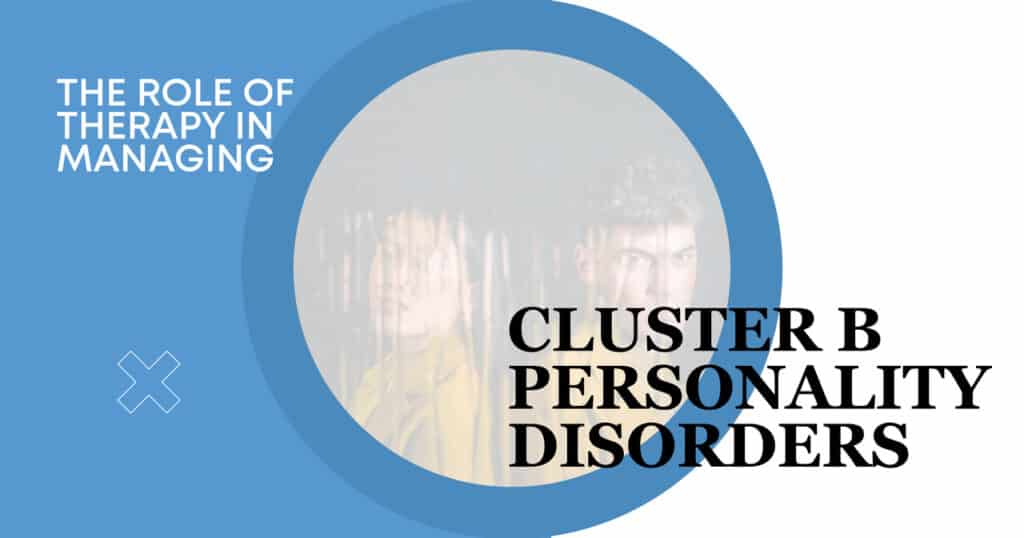Introduction to Cluster B Personality Disorders
Have you ever wondered why some people’s behavior swings wildly from one extreme to another? Or why do they seem to thrive on drama and chaos? Well, they might be dealing with Cluster B personality disorders. These mental disorders can be incredibly challenging, not just for the individuals affected but also for those around them. People with personality disorders often display patterns of behavior that can be difficult to understand. However, there’s hope. The role of therapy in managing Cluster B personality disorders can’t be overstated. Individuals can learn and understand their emotions and behaviors more effectively with the right therapeutic approach.
What Are Cluster B Personality Disorders?
Cluster B personality disorders are a group of mental health conditions characterized by dramatic, overly emotional, or unpredictable thinking or behavior. They include:
- Borderline Personality Disorder (BPD): Characterized by intense emotions, unstable relationships, and a fear of abandonment. Individuals with BPD may also experience emotional dysregulation, leading to impulsive behavior and significant distress in their personal relationships.
- Narcissistic Personality Disorder (NPD): Involves a grandiose sense of self-importance, a plenty of need for admiration, and lack of empathy. This can manifest as an overwhelming desire to be the center of attention, often resulting in superficial relationships.
- Histrionic Personality Disorder (HPD): Features excessive emotionality and a constant need for attention. People with HPD often engage in attention-seeking behaviors and may present with shallow emotions.
- Antisocial Personality Disorder (ASPD): Marked by disregarding others’ rights, impulsivity, and deceitfulness. This disorder is often associated with criminal behavior and a lack of remorse for one’s actions.
Paranoid Personality Disorder and avoidant personality disorder also belong to the wider spectrum of types of personality disorders but are classified differently. Other less common disorders within this cluster include schizotypal personality disorder, schizoid personality disorder, and Obsessive-Compulsive Personality Disorder, each with unique traits and challenges.
The Importance of Therapy in Managing Cluster B Personality Disorders
Understanding the role of therapy in managing Cluster B personality disorders is crucial. These disorders are deeply ingrained in a person’s psyche, often making them resistant to change. Mental health professionals emphasize that therapy offers a structured, supportive environment where individuals can discover their thoughts, feelings, and behaviors and learn healthier ways to interact with the world. Such therapy may also address risk factors and environmental factors that contribute to the development of personality disorders.
Types of Therapy for Cluster B Personality Disorders
Dialectical Behavior Therapy (DBT)
DBT, explicitly developed for BPD, combines cognitive-behavioral techniques with mindfulness practices. It mainly focuses on teaching skills in four key areas that include:
- Mindfulness: Staying present and fully engaging in the moment.
- Distress Tolerance: Tolerating pain in difficult situations without resorting to harmful behaviors.
- Emotion Regulation: Understanding and managing intense emotions.
- Interpersonal Effectiveness: Navigating interpersonal relationships more effectively and assertively.
Cognitive Behavioral Therapy (CBT)
CBT is a widely used therapy that helps individuals identify and change negative thought patterns and behaviors. For Cluster B personality disorders, CBT can help:
- Challenge distorted thinking patterns.
- Develop healthier coping mechanisms.
- Improve problem-solving skills.
Psychodynamic Therapy
Psychodynamic therapy explores the unconscious mind and how past experiences shape current behavior. It aims to:
- Increase self-awareness.
- Understand underlying emotions and conflicts.
- Foster healthier relationships.
Schema Therapy
Schema therapy combines elements of CBT, psychodynamic therapy, and attachment theory. It’s particularly effective for individuals with deeply rooted, maladaptive patterns. Schema therapy focuses on:
- Identifying and challenging harmful schemas (core beliefs).
- Developing healthier, more adaptive schemas.
- Enhancing emotional regulation and interpersonal skills.
Benefits of Therapy for Cluster B Personality Disorders
- Emotional Regulation: Therapy helps individuals manage their intense emotions more effectively, reducing impulsive behavior and emotional outbursts.
- Improved Relationships: Through therapy, individuals can develop and understand healthier ways of relating to others, leading to more stable and fulfilling relationships. This can be especially important for those experiencing affective instability.
- Increased Self-Awareness: Therapy fosters greater self-awareness, helping individuals understand their triggers, motivations, and behaviors.
- Better Coping Strategies: Therapeutic interventions equip individuals with practical tools and strategies to cope with life’s challenges in healthier ways. This is vital for individuals with personality disorders facing everyday stressors.
Challenges in Therapy for Cluster B Personality Disorders
While therapy offers significant benefits, it’s not without challenges. Individuals with Cluster B personality disorders might:
- Resist change due to deeply ingrained patterns.
- Struggle with trust issues, making the therapeutic relationship difficult.
- Experience fluctuating motivation and commitment to therapy.
FAQs About The Role of Therapy in Managing Cluster B Personality Disorders
What types of therapy are most effective for Cluster B personality disorders?
Dialectical Behavior Therapy, Cognitive Behavioral Therapy, Psychodynamic Therapy, and Schema Therapy are among the most effective approaches.
Can medication help in managing Cluster B personality disorders?
While medication, such as mood stabilizers, can help manage specific symptoms like anxiety and depression, therapy remains the cornerstone of treatment for personality disorders.
How long does therapy take to see results?
The duration of therapy varies from person to person and depends on the severity of the disorder. Consistent engagement in treatment over months or even years is often required to see significant improvements.
Is it possible to fully recover from a Cluster B personality disorder?
Recovery is a complex and ongoing process. While therapy can lead to significant improvements in functioning and quality of life, managing Cluster B personality disorders often involves a long-term commitment to treatment.
How can family and friends support someone with a Cluster B personality disorder?
Supportive relationships are crucial. Encouraging therapy, practicing patience, setting healthy boundaries, and seeking support for themselves can help family and friends provide practical support.
The Role of Therapy in Managing Cluster B Personality Disorders in Different Settings
Individual Therapy
Individual therapy offers a one-on-one setting where clients can explore their thoughts and feelings. It provides a personalized approach tailored to the individual’s needs and challenges, especially for those dealing with emotional instability.
Group Therapy
Group therapy can be beneficial for those with Cluster B personality disorders. It offers:
- A supportive environment to practice social skills.
- Opportunities to gain insights from others with similar experiences.
- A sense of community and shared understanding.
Family Therapy
Family therapy involves working with family members to improve effective communication, resolve conflicts, and build a supportive home environment. It helps:
- Educate family members about the disorder.
- Develop strategies to support their loved ones.
- Address any relational issues that might exacerbate symptoms, especially in cases of substance abuse or mental health issues.
Final Thoughts
Understanding the role of therapy in managing Cluster B personality disorders is essential for anyone affected by these complex conditions. Therapy provides a pathway to better emotional regulation, improved relationships, and better quality of life. While the journey can be challenging, with commitment and support, individuals with Cluster B personality disorders can make significant strides toward healthier, more fulfilling lives. By collaborating with a mental health professional and implementing a treatment plan, it is possible to navigate the challenges of living with these mental health conditions.




